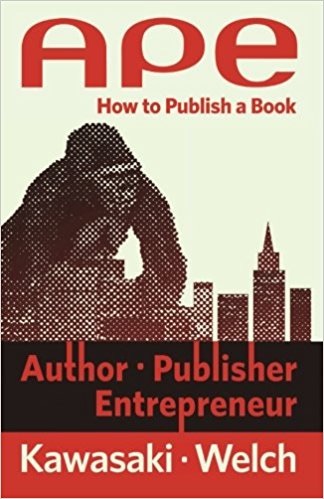
APE: How To Publish a Book by Guy Kawasaki and Shawn Welsh (©2012) As the digital world has created a revolutionary opportunity for writers to become their own publishers, a new self-publishing infrastructure has emerged. This book offers a guide to this new publishing universe with details and inspiration. After you read this you are unlikely to let anyone tell you that you shouldn’t, wouldn’t, or couldn’t write a book. The APE in the title stands for Author, Publisher, and Entrepreneur, and Guy and Shawn devote sections of this book to each part of the process. It makes for a great read and a better reference as you bring your book to life. Be sure to click the icon at the bottom of any page to support this stellar self-published effort.
Guy and Shawn
- Guy Kawasaki is the author of eleven previous books, including What the Plus!, Enchantment, and The Art of the Start. He is also the cofounder of Alltop.Com and the former chief evangelist of Apple. Kawasaki has a BA from Stanford University, an MBA from UCLA, and an honorary doctorate from Babson College.
- Shawn Welch is the author of From Idea to App, iOS 5 Core Frameworks, and iOS 6 for Developers. He is also the developer of several iOS apps. Previously he worked as a senior media editor for Pearson Education. He helped pioneer many of Pearson’s earliest efforts in iPad solutions. Welch has a BS from Kansas State University.
[Author Section] Why should anyone give a shiitake about your book?
- This is the question Guy starts with to help you decide if you should write a book in the first place. Keep in mind that people by books to help themselves, not to further your career. Question two is, will your book enrich your readers with some combination of knowledge, understanding, entertainment, or laughter? If your answer is yes you should write a book. Other good reasons include the value of the intellectual challenge, furthering a cause you believe in, and the therapeutic value of the process. Bad reasons are thinking you are in popular demand and that you will make a lot of money. You just might. but the odds are against you.
Some Publishing History
- While we don’t have to wait for scribes to hand copy books anymore, publishing a book in the traditional way still takes twelve to eighteen months. Authors and readers can’t wait this long anymore. Guy details the steps and the people involved in the traditional approach from agents to editors to copy editors to publicists. He warns about being rejected, and gives examples of many famous writers who had rejection experiences. He notes that traditional publishing is under siege by many forces, and may not be appropriate for writers like you. Self-publishing, on the other hand, is the best thing that has ever happened to writers.
The Self-Publishing Revolution
- Traditional publishing grew up in a world with limits and logistics such as shelf space, access to printing presses, editing and production expertise, and shipping of physical books. The 1980’s brought us laser printers and software that allowed anyone to publish. This was followed by electronic delivery systems that eliminated the need to print physical books. As a result, publishing is more democratic. That doesn’t mean, however, that the quality is any better. Any intermediaries between the author and the reader must add value or face their demise.
- Now authors can control content, design, and how long the marketing effort lasts. With print on demand services, books can stay in print for any length of time and revisions are easy to make. More, if not all, of the profit goes to the author. You can get global distribution, set your own price, cut quantity or license deals, and monitor sales as you wish.





